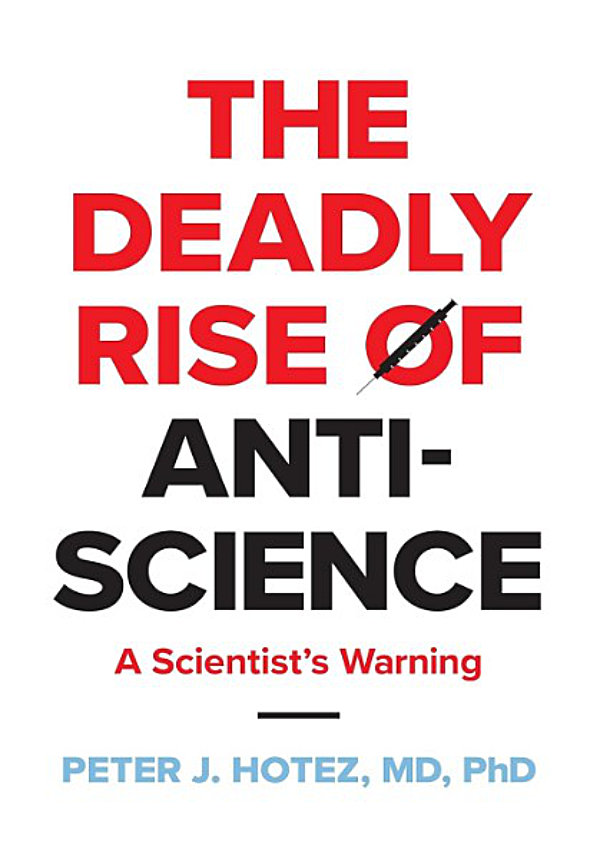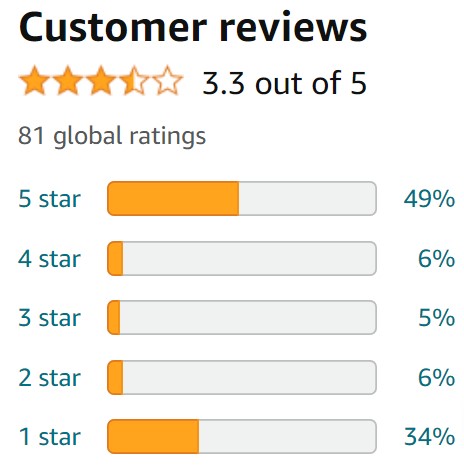The Deadly Rise of Anti-Science: book by Peter Hotez

Peter Hotez and his team have developed inexpensive vaccines and distributed them to the Third World through a nonprofit organization. No good deed goes unpunished, and as he describes in the book The Deadly Rise of Anti-Science, he was therefore vilified by the anti-vaccination faction. Anti-vaxxers, as they are often called, have gained so much influence that so far 200,000 Americans have died of Covid because they refused the vaccine.
Anti-vaxxers have had enough influence that we now see occasional outbreaks of measles, a disease that once had been virtually eliminated. I remember the polio epidemic of the 1940’s and -50’s, and I am very much afraid that mandatory vaccinations for students in public schools may be on the way out. Indeed, Dr. Hotez notes that preliminary data show declines in childhood immunization in conservative states.
Dr. Hotez sees the anti-vaxxers as part of a right-wing conspiracy to undermine not just vaccination but science in general. You may consider it overstatement, but he compares the anti-vaccination, anti-science movement to similar movements in Stalinist Russia and Nazi Germany. He is sufficiently concerned that he suggests courses in science communication for graduate students. Additionally, he suggests something like a Southern Poverty Law Center to protect scientists and academics, but the proposal is too vague to merit much discussion here.
At any rate, the problem has become political, not scientific. Virtually no reputable scientists doubt the value of vaccines (nor accept the efficacy of hydrochloroquine or ivermectin). Nevertheless, a significant amount of money from right-wing sources is spreading disinformation about vaccination, just as they have about climate change and evolution. Russia has also apparently developed a program of vaccine disinformation aimed at the United States. Vaccine denialism is also spreading worldwide. Dr. Hotez claims that far-right and extremist groups “play hardball.” I think he is mistaken: they play snowball with rocks concealed inside their snowballs. No one, he says, is coming to our rescue; we have to take care of ourselves.
At one time, Dr. Hotez went public and appeared in television interviews, including on Fox News, in an attempt, as he put it, to reach across the aisle. When he was subsequently attacked by the right wing, most ominously white supremacists and anti-Semites, he checked in with the climate-change expert Michael Mann and found that the attack by climate-change deniers paralleled the attack by anti-vaxxers. Climate scientists now have a system for responding to the attacks.
The anti-science faction is already sufficiently in control in, say, Florida that the governor there gets his advice from “contrarians and so-called experts from far-right think tanks.” In this vein, you may read a nice section on Trofim Lysenko and the influence he had in the Soviet Union under Stalin. The brain drain from Nazi Germany may also be relevant.
The book makes a case for vaccination and also notes that the number and distribution of those who succumbed to the Covid virus (and therefore did not vote) could have been enough to tip the last presidential election in favor of Pres. Biden.
In time, Dr. Hotez says,
[he] came to believe the tremendous loss in human life from the COVID-19 immunization refusal was not an accident but an orchestrated product of a networked political ecosystem of anti-science extremism.
Unfortunately, he notes, you cannot defeat this kind of anti-science extremism with facts and data; emotional appeals can be far more compelling (see also my article on How to Talk to a Science Denier, by Lee McIntyre). The government, for its part, hoped the extremists would run out of gas and “die a quiet death.”
Dr. Hotez is a professor of Tropical Medicine at Baylor College of Medicine in Houston and has an appointment at the Texas Children’s Hospital. He was introduced to the anti-science world when he published a book, Vaccines Did Not Cause Rachel’s [his daughter’s] Autism, and was attacked by the anti-vaxx crowd, which believes otherwise, partly as a result of a thoroughly discredited study. He worked hard to develop the Covid vaccine and supply it to the Third World. He was nominated for the Nobel Peace Prize, as he reminds us more than once, but I had the impression that it was his own colleagues who nominated him. The book, while good and useful, sometimes has a little more personal narrative than I might have wanted and appears just a wee bit self-serving.

In case you were wondering, the book gets a sizeable number of one-star reviews on Amazon (see the figure). Some of the reviewers have read the book; some have not. I imagine it is a quasi-orchestrated attempt to denigrate the work, as happened previously with respect to the film, We Believe in Dinosaurs.
I told myself I would not exactly review the book, but I cannot help noticing mistakes like these: pedal for peddle, diffuse for defuse. Additionally, I was somewhat put off by the use of first names – Tony instead of Fauci or Dr. Fauci – which had the effect, probably unintentional, of showing how the author is on first-name terms with several VIP’s.
[open rant]And finally, I am the author or co-author of 5 published books, so I am the last person who would begrudge a publisher or an author their due. Yet I was very put off when I found that the Kindle edition cost $21.34, whereas the hardback (there is no paperback) cost $24.95 $22.46, or $1.12 more than the Kindle – and I do not even get to own the Kindle edition! Surely, the marginal cost of manufacturing the hardback book is well over $1.12. So I confess that, in a fit of pique, I borrowed the Kindle edition from a library. It seems to me that a Kindle book, which I technically lease but do not purchase, has virtually no marginal cost and ought to cost less than a paperback, yet their prices are slowly inching up.[end rant]
